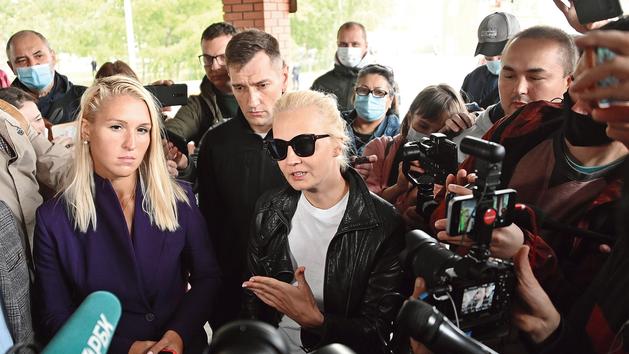The situation remained confused for a good part of the day, Friday, around the fate of Alexeï Navalny, leader of the Russian opposition, plunged into an artificial coma since the day before. The contradictory statements of the official doctors and the police force gave the feeling that the Russian authorities did not know on which foot to dance. The obtuse and enigmatic refusal to allow relatives to go to his bedside, as well as to let him take a specially chartered plane to evacuate him to Berlin, outraged the relatives and supporters of the anti-corruption crusader. Until the Russian doctors decide, at the very end of the day, to authorize his departure for Germany.
"We have taken the decision not to oppose his being transported to another hospital, the one designated by his relatives," said Anatoly Kalinichenko, deputy director of the number one emergency hospital. 'Omsk, adding that “his condition is stable” . Thursday morning, Alexeï Navalny had been taken by a violent malaise in an airliner connecting Tomsk to Moscow.
Read also: Alexeï Navalny, a popular blogger who became the number one opponent of Vladimir Putin
In a “first positive development” for the relatives of the victim, German doctors were authorized at the end of the day to examine him. Before that, they had to wait several hours at Omsk airport in an ambulance plane sent by the NGO Cinema for Peace Foundation, in the hope that he would be treated in the Charité clinic in Berlin.
This visit by German doctors came shortly after the opponent's wife, Yulia Navalnaya, appealed to Vladimir Putin. "I officially appeal to you [Vladimir Putin] to authorize the evacuation of Alexey Navalny to Germany," she wrote in an open letter posted on social networks.
The chief doctor of the Omsk hospital, Alexander Murakhovsky, initially refused to authorize the evacuation of Alexey Navalny "until his condition stabilizes" . Relatives of the opponent on the spot, including his wife and his personal doctor Anastasia Vassilieva, for their part assured that they had received assurances from German doctors that it was transportable and should be evacuated immediately.
No definitive diagnosis
In the middle of the day on Friday, Alexander Murakhovsky told reporters: “The diagnosis to which we are most prone now is a carbohydrate balance disorder, that is to say a metabolic disease. This may be due to a sharp drop in blood sugar. ” According to him, the blood test did not reveal any toxic substances in the patient's blood. Without being definitive, this diagnosis invalidates the thesis according to which Alexeï Navalny was poisoned.
However, at about the same time, the Interior Ministry of the Omsk region published a statement on its website citing the presence of a toxic substance on the victim's body. "Chromatographic examination showed the presence of the substance 2-ethylhexyl diphenyl phosphate, a substance used in the chemical industry", on the skin, hair, nails and clothes of Alexey Navalny, the press release said. also states that he was unable to determine the concentration of the product. The Interior Ministry does not rule out that the substance could have penetrated Navalny's skin, hair or nails through a plastic cup. Relatives of the opponent suspect that a cup of tea consumed at Tomsk airport may have contained poison.
Read also: Russia-China: two empires in faience dogs
In 2006, opponent Alexander Litvinenko, a defector from the FSB, was killed a few days after drinking a poisoned cup of tea in a London bar. Polonium 210, an extremely toxic radioactive substance, was then used. Polonium 210 has the particularity of gradually causing irreversible damage to vital organs while completely disappearing after a few days. British authorities at the time concluded that it was a "state-sponsored assassination orchestrated by Russian security services" , which the Kremlin has consistently denied.
“The ban on transporting Navalny serves only to waste time and wait until the traces of poison in his body are undetectable. Every additional hour is a threat to his life, ”said Anastasia Vassilieva.
Over the past three years, Alexei Navalny has been the victim of a mysterious poisoning in a detention center and an assault in the street, in which a chemical substance nearly deprived him of sight. Identified as pro-Kremlin activists, the two attackers were never bothered by Russian justice.

